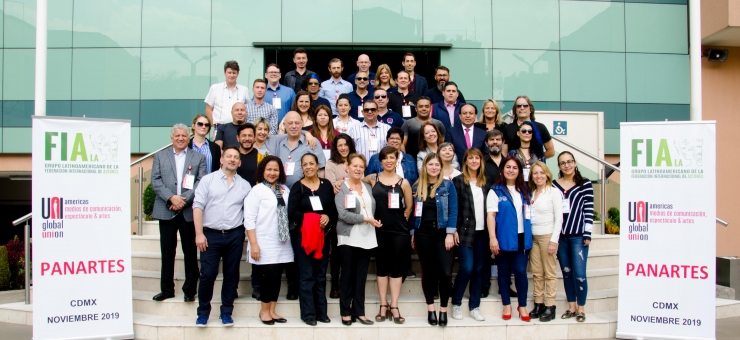Capacity building for cast and crew unions in Latin America

Over 50 trade union leaders from audiovisual sector unions in Latin America from the UNI MEI and FIA membership gathered in November in Mexico City for a regional capacity building seminar. The event was organized as part of a two-years’ project funded with the support of the Swedish union Teaterförbundet and Union to Union and aimed to increase the capacity of union leaders in Latin America to make unions more powerful and sustainable. The capacity building seminar focused on a series of issues which are of key concern to unions and workers in the audiovisual sector, including how to address sexual harassment, how to increase gender equality in the workplace, and how to enhance collective bargaining in the audiovisual sector. UNI MEI members Teaterförbundet from Sweden and IATSE from the USA and Canada who participated actively during the seminar, as well as the UNI Americas’ office and the UNI Global Union Equal Opportunities Department contributed to the success of this year’s training seminar. The Mexico seminar benefitted also from the active support of UNI MEI member SITATYR which welcomed the delegates at their headquarters in Mexico City.
In a global context of increased awareness that unions and employers need to address this issue in a systematic way, the seminar was opened with an in-depth training on how to tackle sexual harassment in the audiovisual industry. Veronica Fernandes Mendez, Head of the UNI Global Union Equal Opportunities Department, and union leaders from Argentina, Chile, the USA, and Sweden provided a set of resourceful examples and on how unions can detect, prevent and address cases of sexual harassment, and how they can accompany victims of sexual harassment.
Increasing gender equality in the workplace was the focus of a second full-day training session, providing union leaders with concrete tools and good practices, such as checklists, charters, and collective bargaining mechanisms which can significantly improve gender equality in key areas including equal pay, work-life balance, gender stereotypes, and women in decision making positions.
Finally, union leaders focused on how to intensify and relaunch collective bargaining in the audiovisual sector across the region. Several good practices of collective bargaining at enterprise and sector level were show-cased and triggered a region-wide debate on how unions can effectively relaunch collective bargaining to achieve agreements which are inclusive of all workers in the sector and tackle some of the mots burning issues for workers in sector, including outsourcing, improved working conditions, health and safety at work, up-skilling, and pay rise.

